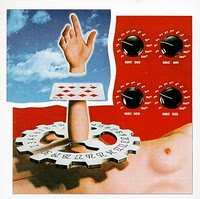 While the Grateful Dead don’t play on Garcia’s first solo album — it’s Jerry on everything except drums, which Bill Kreutzmann plays — you can, fairly, call this a Dead album in disguise. Not only did the six songs on the record all enter the band’s repertoire, most of them becoming mainstays, but the music very much inhabits the same sound world as Workingman’s Dead or American Beauty. Imagining those songs with, say, Bob Weir’s “Playing in the Band” and a Pigpen tune or two is enough to make you mourn the Great Dead Album That Wasn’t. Still, never mind; this is far and away Garcia’s best solo record, and even with the creepy sound experiments that fill out the second side — which I happen to like but clash somewhat — this just misses the full five stars. Apparently it’s Cher’s favourite album ever! –Brad
While the Grateful Dead don’t play on Garcia’s first solo album — it’s Jerry on everything except drums, which Bill Kreutzmann plays — you can, fairly, call this a Dead album in disguise. Not only did the six songs on the record all enter the band’s repertoire, most of them becoming mainstays, but the music very much inhabits the same sound world as Workingman’s Dead or American Beauty. Imagining those songs with, say, Bob Weir’s “Playing in the Band” and a Pigpen tune or two is enough to make you mourn the Great Dead Album That Wasn’t. Still, never mind; this is far and away Garcia’s best solo record, and even with the creepy sound experiments that fill out the second side — which I happen to like but clash somewhat — this just misses the full five stars. Apparently it’s Cher’s favourite album ever! –Brad
Jive Time Turntable
The Byrd “Dr. Byrds & Mr. Hyde” (1969)
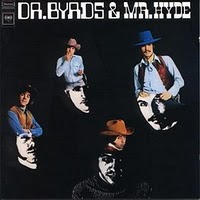 Kicking off with an appropriately incendiary and doom-laden cover of a song best known from the Band’s Big Pink, this is not your L.A. hippie’s Byrds. Or is it? It’s a schizophrenic mess, really, as befits its title: the second track is a bounding little country ditty dedicated to a late dog, and, as a dog lover, I have to say I’ve got a soft spot for this, but it’s an unintegrated piece of a puzzling mess of a record, with a backhanded ode to the shitkickers that inspired their foray into country and western in the first place; a few remnants of their early psychedelic folk; a bizarre blues medley that doesn’t sound like much of anything (and not really in a good way); and a few other hybrids of the kind that would later prompt the term “alt-country.” These, and a really great proto-metal tune called “Bad Night at the Whisky.” Scattershot in song-form, production, and the level of commitment in its songwriting and performance, it’s really a McGuinn solo record backed up with a bunch of studio players who’re not always providing a sympathetic setting for the man’s restless (do I mean aimless?) creativity. Even so, I’d agree with reviewers who say this record doesn’t really get its due, ’cause sometimes there’s something to be said for schizophrenic messes—especially those that have such a strange, dark undercurrent. I probably prefer this to some of their more lauded releases. –Will
Kicking off with an appropriately incendiary and doom-laden cover of a song best known from the Band’s Big Pink, this is not your L.A. hippie’s Byrds. Or is it? It’s a schizophrenic mess, really, as befits its title: the second track is a bounding little country ditty dedicated to a late dog, and, as a dog lover, I have to say I’ve got a soft spot for this, but it’s an unintegrated piece of a puzzling mess of a record, with a backhanded ode to the shitkickers that inspired their foray into country and western in the first place; a few remnants of their early psychedelic folk; a bizarre blues medley that doesn’t sound like much of anything (and not really in a good way); and a few other hybrids of the kind that would later prompt the term “alt-country.” These, and a really great proto-metal tune called “Bad Night at the Whisky.” Scattershot in song-form, production, and the level of commitment in its songwriting and performance, it’s really a McGuinn solo record backed up with a bunch of studio players who’re not always providing a sympathetic setting for the man’s restless (do I mean aimless?) creativity. Even so, I’d agree with reviewers who say this record doesn’t really get its due, ’cause sometimes there’s something to be said for schizophrenic messes—especially those that have such a strange, dark undercurrent. I probably prefer this to some of their more lauded releases. –Will
Sam Rivers “Contours” (1965)
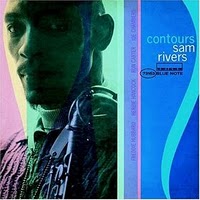 Along with True Blue by Tina Brooks this is one of those Blue Note LPs that is painfully rare and unheard. What a shame as it is an absolute classic. Very different in feel to Brooks but just as essential. Avant Garde yet never forgetting to swing and what a line up: Hubbard, Hancock, Carter and Chambers! That should be worth the price of the LP alone but Rivers stamps his authority all over the set which is no mean feat in this company. His solos are at times tempered and sensitive and at other times scream with bursts of noise from the speakers. Carter and Hubbard are also on great form. The album also highlights what a great composer Rivers was. –Jon
Along with True Blue by Tina Brooks this is one of those Blue Note LPs that is painfully rare and unheard. What a shame as it is an absolute classic. Very different in feel to Brooks but just as essential. Avant Garde yet never forgetting to swing and what a line up: Hubbard, Hancock, Carter and Chambers! That should be worth the price of the LP alone but Rivers stamps his authority all over the set which is no mean feat in this company. His solos are at times tempered and sensitive and at other times scream with bursts of noise from the speakers. Carter and Hubbard are also on great form. The album also highlights what a great composer Rivers was. –Jon
Various Artists “Transformers: The Movie” (1986)
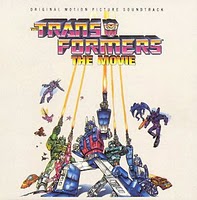 The battle’s over, but the war has just begun… There was only one place any boy in the summer of ’86 wanted to be – in the local multiplex soaking in Transformers: The Movie. Stepped-up animation, Transformers (including the presumedly indestructible Optimus Prime) getting shot and DYING, and bad language, this one promised a full dose of PG thrills. A few decades later, the movie is more of a chore to sit through, but the soundtrack holds up as a snapshot of mid 80’s pre-teen dreamin’. A mix of period AOR, slick metal, and evocative fusion/prog instrumentals, Transformers: The Movie plays up the good guy/bad guy angle with Stan Bush’s amazing double-shot of self-confidence in “The Touch” (reprised by Mark “Marky Mark” Whalberg in Boogie Nights) and “Dare,” while Kick Axe transform into Spectre General to deliver some evil Decepticon rock with “Nothing’s Gonna Stand in Our Way” and “Hunger.” Lion’s metallized version of the classic theme song is a pure laserblast of energy, and NRG’s “Instruments of Destruction” keeps the cannons blazing. Wrap it up with Scotti Bros. pride and joy, “Weird” Al Yankovic doing his best Devo impression on a rallying cry to kids across the country strung out on sugar and Atari, “Dare to be Stupid,” and I’m ready to slap on my Walkman, and hop on the ol’ Huffy BMX for some suburban curb burnin’. Transform and roll out! –Ben
The battle’s over, but the war has just begun… There was only one place any boy in the summer of ’86 wanted to be – in the local multiplex soaking in Transformers: The Movie. Stepped-up animation, Transformers (including the presumedly indestructible Optimus Prime) getting shot and DYING, and bad language, this one promised a full dose of PG thrills. A few decades later, the movie is more of a chore to sit through, but the soundtrack holds up as a snapshot of mid 80’s pre-teen dreamin’. A mix of period AOR, slick metal, and evocative fusion/prog instrumentals, Transformers: The Movie plays up the good guy/bad guy angle with Stan Bush’s amazing double-shot of self-confidence in “The Touch” (reprised by Mark “Marky Mark” Whalberg in Boogie Nights) and “Dare,” while Kick Axe transform into Spectre General to deliver some evil Decepticon rock with “Nothing’s Gonna Stand in Our Way” and “Hunger.” Lion’s metallized version of the classic theme song is a pure laserblast of energy, and NRG’s “Instruments of Destruction” keeps the cannons blazing. Wrap it up with Scotti Bros. pride and joy, “Weird” Al Yankovic doing his best Devo impression on a rallying cry to kids across the country strung out on sugar and Atari, “Dare to be Stupid,” and I’m ready to slap on my Walkman, and hop on the ol’ Huffy BMX for some suburban curb burnin’. Transform and roll out! –Ben
Gil Scott-Heron “Pieces of a Man” (1971)
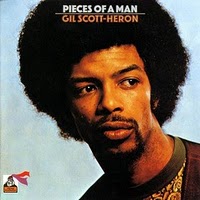 The song “The Revolution Will Not Be Televised” is the earliest incidence of rap that I’ve heard so far. What’s more, it features the flute playing of Hubert Laws. That’s right, flute in a rap song. The next thing that really struck me was the bass. None other than Ron Carter makes the switch to electric bass, reminding me of Jaco Pastorius a little bit. Those three musicians form a deadly trio. Hubert Laws only plays on three songs, I think. That’s not much of an issue though because he wouldn’t have really fit in many of the other songs. The style of the music varies from fusion on the first half to soul and jazz on the rest of the record. What takes the album from being good to being great is the fact that everyone can identify with the lyrics about the plight of African Americans and subjects like depression. “Lady Day and John Coltrane” feels more like a statement about the power of music in general to enhance you life, with John Coltrane and Billie Holiday used as examples. Scott-Heron has made it known on his records that he’s a huge fan of Coltrane. Kind of makes a person wonder what kind of crazy supergroup would have been inevitable had a few people not died prematurely. Let’s say Coltrane lived on. Heron might have used Ron Carter to recruit Coltrane into this band. Pretty much wherever Coltrane went, Elvin Jones followed, so they wouldn’t have had to look far for a drummer. So far we’ve got flute, vocal, drums, sax and bass. What about guitar? The only right person for the job would have Jimi Hendrix, yet another victim of too much celebrity. Maybe throw John’s talented wife Alice in on piano and harp. Voila! Potentially one of the best supergroups that will never be. It’s sad, really. What I like better about this album versus Free Will is the presence of Ron Carter and that the lyrics are still political but don’t go so far as to border on being anti-white. It’s one thing to stick up for your people but it’s other to sound like you’re verbally attacking another group in the process. Let’s not fight hate with hate. Pieces of a Man was released the same year as What’s Going On by Marvin Gaye, has just as much political and social commentary, might be better, and yet gets a meager amount of recognition in comparison. Yup, that’s about how much sense I’ve come to expect from the music world. –Rob
The song “The Revolution Will Not Be Televised” is the earliest incidence of rap that I’ve heard so far. What’s more, it features the flute playing of Hubert Laws. That’s right, flute in a rap song. The next thing that really struck me was the bass. None other than Ron Carter makes the switch to electric bass, reminding me of Jaco Pastorius a little bit. Those three musicians form a deadly trio. Hubert Laws only plays on three songs, I think. That’s not much of an issue though because he wouldn’t have really fit in many of the other songs. The style of the music varies from fusion on the first half to soul and jazz on the rest of the record. What takes the album from being good to being great is the fact that everyone can identify with the lyrics about the plight of African Americans and subjects like depression. “Lady Day and John Coltrane” feels more like a statement about the power of music in general to enhance you life, with John Coltrane and Billie Holiday used as examples. Scott-Heron has made it known on his records that he’s a huge fan of Coltrane. Kind of makes a person wonder what kind of crazy supergroup would have been inevitable had a few people not died prematurely. Let’s say Coltrane lived on. Heron might have used Ron Carter to recruit Coltrane into this band. Pretty much wherever Coltrane went, Elvin Jones followed, so they wouldn’t have had to look far for a drummer. So far we’ve got flute, vocal, drums, sax and bass. What about guitar? The only right person for the job would have Jimi Hendrix, yet another victim of too much celebrity. Maybe throw John’s talented wife Alice in on piano and harp. Voila! Potentially one of the best supergroups that will never be. It’s sad, really. What I like better about this album versus Free Will is the presence of Ron Carter and that the lyrics are still political but don’t go so far as to border on being anti-white. It’s one thing to stick up for your people but it’s other to sound like you’re verbally attacking another group in the process. Let’s not fight hate with hate. Pieces of a Man was released the same year as What’s Going On by Marvin Gaye, has just as much political and social commentary, might be better, and yet gets a meager amount of recognition in comparison. Yup, that’s about how much sense I’ve come to expect from the music world. –Rob
Bruce Springsteen “Nebraska” (1982)
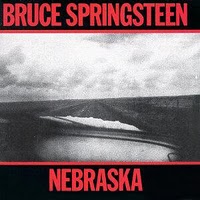 For this, I will forgive all the frat boy anthems. For this, I will forgive “Dancing in the Dark”. Hell, I’ll forgive Springsteen’s entire post-1985 career for this haunted, scarifying record that seems beamed directly in from a black and white movie from 1949. In its own strange way it’s as avant-garde as any French new wave film; here’s an eternally rural America where teenagers kill their families, the churches are filled with bodies, the highway stretches out endlessly before us and it’s always the hour before dawn. –Brad
For this, I will forgive all the frat boy anthems. For this, I will forgive “Dancing in the Dark”. Hell, I’ll forgive Springsteen’s entire post-1985 career for this haunted, scarifying record that seems beamed directly in from a black and white movie from 1949. In its own strange way it’s as avant-garde as any French new wave film; here’s an eternally rural America where teenagers kill their families, the churches are filled with bodies, the highway stretches out endlessly before us and it’s always the hour before dawn. –Brad
Rancid “…And Out Come the Wolves” (1995)
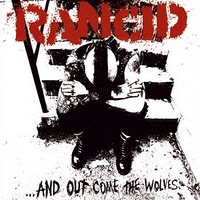 Rancid’s …And Out Come the Wolves is an often overlooked classic from the 90’s. I guess you could say that the album was my first true punk experience and I’m sure many of you would disagree about this being *true* punk, but anyway you look, it had massive influence on my musical growth and even got me into such hardcore legends as Black Flag, Minor Threat, Dead Kennedy’s, and pretty much every other US punk band you can think of. I’ll be glad to admit the fact that …Wolves is a little overfilled, but all the songs are catchy as hell and I really couldn’t do without any of them. Many among my age might credit Green Day for opening the doors to “old school” punk education, not for me because I never really saw them as punk or even being punk influenced (no matter how many times Billy Joe wanted to praise The Clash) and their records from that time have become increasingly stale through the years. Rancid, on the other hand still sounds fresh and full of forceful energy and show no signs of slowing down. …And Out Come the Wolves is by far one of the greatest (and most underrated) albums from the 90’s and continues to hold many fond memories from my youth that I wouldn’t trade for anything in the world. –Jason
Rancid’s …And Out Come the Wolves is an often overlooked classic from the 90’s. I guess you could say that the album was my first true punk experience and I’m sure many of you would disagree about this being *true* punk, but anyway you look, it had massive influence on my musical growth and even got me into such hardcore legends as Black Flag, Minor Threat, Dead Kennedy’s, and pretty much every other US punk band you can think of. I’ll be glad to admit the fact that …Wolves is a little overfilled, but all the songs are catchy as hell and I really couldn’t do without any of them. Many among my age might credit Green Day for opening the doors to “old school” punk education, not for me because I never really saw them as punk or even being punk influenced (no matter how many times Billy Joe wanted to praise The Clash) and their records from that time have become increasingly stale through the years. Rancid, on the other hand still sounds fresh and full of forceful energy and show no signs of slowing down. …And Out Come the Wolves is by far one of the greatest (and most underrated) albums from the 90’s and continues to hold many fond memories from my youth that I wouldn’t trade for anything in the world. –Jason
Flipper “Album: Generic Flipper” (1982)
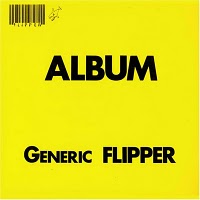 Dirt, drug-fueled, filth-ridden punk is the best way to describe Flipper’s Generic album. It’s not exactly fast paced like many other punk bands of the time, but it makes up for it with its sheer brilliance of heavy sludge guitars and downer lyrics. If you’re looking for in your face sweet talk go else where, this set is devoted to the noise crazed enslaving crowds. And every track plays off the next, ultimately concluding to the epic closer, “Sex Bomb” — which is literally one of the most enthralling songs ever recorded. The whole album is an all filth, visceral, perfect mess. Highly recommended! –Jason
Dirt, drug-fueled, filth-ridden punk is the best way to describe Flipper’s Generic album. It’s not exactly fast paced like many other punk bands of the time, but it makes up for it with its sheer brilliance of heavy sludge guitars and downer lyrics. If you’re looking for in your face sweet talk go else where, this set is devoted to the noise crazed enslaving crowds. And every track plays off the next, ultimately concluding to the epic closer, “Sex Bomb” — which is literally one of the most enthralling songs ever recorded. The whole album is an all filth, visceral, perfect mess. Highly recommended! –Jason
Charles Mingus “Oh Yeah” (1962)
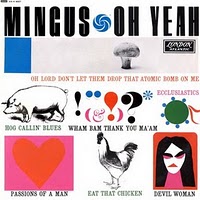 That Mingus had in mind to do something different on this record can be divined by the fact that he plays piano instead of bass here. And he sings … badly. Plus he hires both Roland Kirk and Booker Ervin to play sax — and if you can think of two more disparate players, send your answers on a postcard to me. The end result is one of Mingus’ earthiest, bluesiest, craziest and, well, most unhinged albums; if the songwriting isn’t up to, say, Ah Um, it makes up for it in sheer loopiness. “Passions of a Man” is the most avant-garde and complicated track here, perfectly balanced by the sleazy R&B of “Eat That Chicken”. And who can disagree with the sentiments of “Oh Lord Don’t Let Them Drop That Atomic Bomb On Me”? Unsung hero: Dannie Richmond. Again. –Neal
That Mingus had in mind to do something different on this record can be divined by the fact that he plays piano instead of bass here. And he sings … badly. Plus he hires both Roland Kirk and Booker Ervin to play sax — and if you can think of two more disparate players, send your answers on a postcard to me. The end result is one of Mingus’ earthiest, bluesiest, craziest and, well, most unhinged albums; if the songwriting isn’t up to, say, Ah Um, it makes up for it in sheer loopiness. “Passions of a Man” is the most avant-garde and complicated track here, perfectly balanced by the sleazy R&B of “Eat That Chicken”. And who can disagree with the sentiments of “Oh Lord Don’t Let Them Drop That Atomic Bomb On Me”? Unsung hero: Dannie Richmond. Again. –Neal
Robert Fripp “Exposure” (1979)
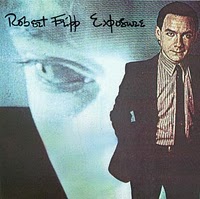 I may be alone in thinking this is a greater record than anything King Crimson ever did, but I shouldn’t be. Here Fripp harnesses his experimental side to actual polished pop songs — nothing here goes much over four minutes — and the cast of thousands is used to good effect. Terre Roche screams her lungs out on the title track, a kind of modernist update of “The Great Gig in the Sky”; Peter Gabriel reprises “Here Comes the Flood”, perhaps the most affecting song either he or Fripp has ever been connected with; and Daryl Hall, of all people, hits the high spot with his wistful voice on the guitar looped “North Star”. It’s the perfect meld of prog-meets-art rock-meets-new wave-meets-soul, and I don’t think it’s a coincidence that it came out in 1979, a time when music had collapsed into a huge melting pot and for a brief moment anything seemed possible (of course it all began to harden into separate genres — very separate — almost immediately). No coincidence, either, that Exposure marks a decade since In the Court of the Crimson King. –Brad
I may be alone in thinking this is a greater record than anything King Crimson ever did, but I shouldn’t be. Here Fripp harnesses his experimental side to actual polished pop songs — nothing here goes much over four minutes — and the cast of thousands is used to good effect. Terre Roche screams her lungs out on the title track, a kind of modernist update of “The Great Gig in the Sky”; Peter Gabriel reprises “Here Comes the Flood”, perhaps the most affecting song either he or Fripp has ever been connected with; and Daryl Hall, of all people, hits the high spot with his wistful voice on the guitar looped “North Star”. It’s the perfect meld of prog-meets-art rock-meets-new wave-meets-soul, and I don’t think it’s a coincidence that it came out in 1979, a time when music had collapsed into a huge melting pot and for a brief moment anything seemed possible (of course it all began to harden into separate genres — very separate — almost immediately). No coincidence, either, that Exposure marks a decade since In the Court of the Crimson King. –Brad
The Holy Modal Rounders “The Moray Eels Eat the Holy Modal Rounders” (1969)
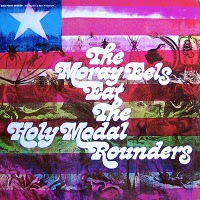 Acid folk? Nope. This is something far stranger: acid country-rock. Acid bluegrass, even. Basically it’s like someone took Live/Dead, Workingman’s Dead, American Beauty and Aoxomoxoa and decided to stick ’em in a blender, then play them all simultaneously, while smoking prodigious amounts of dope and running Easy Rider backwards so a bunch of dead hippies get brought back to life by rednecks with magic rifles. But better. –Brad
Acid folk? Nope. This is something far stranger: acid country-rock. Acid bluegrass, even. Basically it’s like someone took Live/Dead, Workingman’s Dead, American Beauty and Aoxomoxoa and decided to stick ’em in a blender, then play them all simultaneously, while smoking prodigious amounts of dope and running Easy Rider backwards so a bunch of dead hippies get brought back to life by rednecks with magic rifles. But better. –Brad
Billy Cobham “Spectrum” (1973)
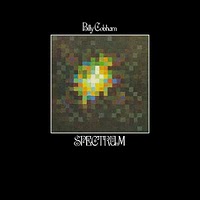 I might be one of the few people who ventured into this album as a Deep Purple fan more than anything else. I’d read that Tommy Bolin’s best work could be found on this album so I wanted to see what all the fuss was about. Since then I’ve found out some more about Mr. Cobham and from “Spectrum” alone, I’m impressed. The band sound really tight on this album and every track bursts with energy. The first track is an absolute mad dash to the end with great soloing and frenetic drumming, but my favorite tracks are “Stratus” and “Red Baron”. Both of these songs have really cool, laid back grooves and the interplay between guitar, keyboard and drums is delightful. After entering into “Spectrum” as a Tommy Bolin fan, I left as a Jan Hammer fan. The keyboard solo’s here are breath-taking, stealing focus from Bolin who is no slouch himself. –Tom
I might be one of the few people who ventured into this album as a Deep Purple fan more than anything else. I’d read that Tommy Bolin’s best work could be found on this album so I wanted to see what all the fuss was about. Since then I’ve found out some more about Mr. Cobham and from “Spectrum” alone, I’m impressed. The band sound really tight on this album and every track bursts with energy. The first track is an absolute mad dash to the end with great soloing and frenetic drumming, but my favorite tracks are “Stratus” and “Red Baron”. Both of these songs have really cool, laid back grooves and the interplay between guitar, keyboard and drums is delightful. After entering into “Spectrum” as a Tommy Bolin fan, I left as a Jan Hammer fan. The keyboard solo’s here are breath-taking, stealing focus from Bolin who is no slouch himself. –Tom


